
- Source: Seven Days analysis of Airbnb data
Josi Kytle said she rents out an apartment on Airbnb so she can afford to live in Stowe. The 41-year-old entrepreneur charges as much as $210 a night for the two-bedroom unit attached to her house, which she bills as "modern" and "only 3 mins to the Mtn!"
Hers is one of 450 accommodations in Stowe listed on Airbnb, an online booking service that allows people to easily rent out rooms and houses. According to a Seven Days analysis, Airbnb rentals make up 12.7 percent of Stowe's housing stock — and that doesn't include listings on other online booking platforms.
Stowe isn't alone. Four of the five Vermont communities with the most Airbnb rentals are ski towns. These mountain hamlets, where the cost of living is already high, are trying to figure out how — or whether — to respond to the steep rise in short-term rentals. They're trying to strike a balance that supports residents such as Kytle but also protects already-scarce housing resources and makes sure "hosts" are playing by the rules.
(Explore data from the top five Vermont Airbnb communities below)
Airbnb can be a lucrative source of income, so it's not surprising that some locals are telling town officials that "we should just leave Airbnb alone," according to Warren zoning administrator Miron Malboeuf.
Hosts in Stowe took in $3 million in 2016, according to data Airbnb provided the state — $400,000 more than their counterparts in Burlington. Those two municipalities shared in the windfall, collecting a 1 percent rooms and meals tax on top of the 9 percent state tax on reported rentals.
Airbnb comes in handy, particularly during peak tourist times, when lodging demand exceeds supply. "Every room in Stowe is fully booked for Christmas and any of the big holidays," Kytle said. Her point: "Stowe needs those beds."
It's a similar story in Warren, population 1,700, which currently has 121 hosts renting out 189 units — about 7.5 percent of the town's housing stock, according to U.S. Census Bureau numbers and data Seven Days pulled from the Airbnb site. "It seems like all of a sudden there's been an explosion of Airbnb hosts in the last year," observed Felix von Moschzisker, who left a job at Life magazine in New York City almost 50 years ago to live and ski in the Mad River Valley.
Now the sculptor uses Airbnb to rent out a bedroom in his hillside house, which has stunning mountain views, for around $100 a night. "I overbuilt a house with a view, and so I'm a little bit broke, and this is my way of making some money," von Moschzisker explained. The 74-year-old has learned a thing or two since he almost froze to death one winter living in an uninsulated shed.
His neighbor, Sugarbush Resort owner Win Smith, doesn't appear to feel threatened by the competition — and he's in the business of renting traditional rooms. "Now we have more availability, more options to attract people to the Mad River Valley," he acknowledged.
Not all of his fellow hoteliers share Smith's reasoning.
"Certainly things are slower in the lodging industry in the last year or two than they have been in the past," said Peter MacLaren, proprietor of West Hill House B&B in Warren. Last Thursday, two cats held court in the otherwise empty living room of the cozy, nine-room establishment he owns with his wife.
MacLaren and other members of the traditional lodging industry have been pushing the state to "level the playing field" with regard to Airbnb. Last year Vermont started collecting rooms and meals taxes from hosts, but it has been slower to take on enforcement responsibilities that would cost money. Specifically, MacLaren wants hosts to meet the same health and fire safety requirements that he follows.
MacLaren insists that his concerns extend beyond his own bottom line; he says he's also worried about the future of his town.
"Airbnb characterizes its [hosts] as little old ladies renting out their rooms during ski season," he said, when in reality, a number of them are professional operations run by property-management companies or out-of-town investors who rent out their units year-round.
It's true that nearly 92 percent of the properties on Airbnb in Warren are entire apartments or houses, rather than single rooms, but it's difficult to determine anything about the entities that are renting them out. In fact, some are traditional inns and B&Bs like MacLaren's that use the platform as a form of free online marketing.
MacLaren suggested that the many alternative accommodations eliminate housing that would otherwise be available to long-term residents or seasonal workers, driving up the overall cost of local real estate.
That concern is shared by some direct beneficiaries of the new revenue stream. "I don't want big corporations or, I hate to say it, very wealthy people coming and buying all the affordable places and turning them into Airbnbs," said Kytle, the Stowe Airbnb host.
Where she lives, affordable places are already scarce; according to the real estate site Zillow, the median home value in Stowe is $415,200, a 12.4 percent increase since last year.
Michael Diender has owned Stowe's Sun & Ski Inn and Suites with his family since 1998. He noted that his employees, including "middle-management people who are making $30,000, $40,000 a year," are finding it increasingly hard to afford housing nearby. "We want people to work for us who are also involved in our community ... so it creates vibrancy, not just on the weekends and the holidays."
But others pointed out that these towns have been attracting — and making money off — transients since Vermont started sprouting ski areas. In Stowe, "something like half the homes are vacation homes," according to the town's zoning administrator, Richard Baker.
In Warren, "It's kind of a time-honored tradition to pack all your belongings in your closet and rent your place for Christmas for $2,000, $3,000 dollars," noted town Planning Commission chair Michael Ketchel. The only difference now, he suggested, is that people are doing it through Airbnb. "There's a lot of hearsay, and it's hard to point to clear statistics" that Airbnb rentals are actually having an impact on long-term housing options, he observed.
In the absence of state regulations, some towns are considering making their own rules. And they can look to Colorado for inspiration. Denver has made permanent residency a requirement for anyone who wants to put a house up for rent for fewer than 30 days. In Telluride, property owners can only rent on a short-term basis three times a year, totaling no more than 29 days. Durango has capped the number of Airbnbs that can operate in certain neighborhoods.
Other resort towns, such as Vail, have chosen to simply register and tax short-term rentals.
Back in Vermont, Stowe is contemplating a zoning change that would require hosts to get a permit in order to rent out a unit, according to Baker.
Warren is rewriting its town plan, and "the Airbnb piece has certainly come up in the discussions around housing," Ketchel said.
The Mad River Valley Planning District recently published a report on affordable housing, which notes that half of the Valley's workforce is "employed in low-wage hospitality and retail jobs ... earning annual wages between $19,560 and $24,159."
Acknowledging the effect of short-term rentals on affordable housing, the report suggests that "elected officials may want to consider tracking, taxing, regulating, permitting and mitigating the impact ... on the availability of workforce housing."
So far, though, there's no consensus in Warren on how best to do that. "We're not sure really how much we want to try to manage that from a local town level," Ketchel said.
Killington town manager Deborah Schwartz isn't aware of any anti-Airbnb sentiment afoot in her town and said she doesn't anticipate attempts to regulate the short-term industry anytime soon.
Thirty minutes away, though, Woodstock is "way ahead of the curve," according to town planner and administrative officer Michael Brands. It passed short-term rental regulations in 2003, long before Airbnb existed. Updated earlier this year, they require property owners to get a permit and limit the number of times a property can be rented per year to 10.
He recognizes, however, that the town can only do so much enforcement. "I don't do 3 a.m. bed checks," said Brands. "That's the way to really enforce it."
Explore the Top Five Vermont Airbnb Towns
About this analysis
For this story, Seven Days collected and analyzed data on 5,895 Vermont Airbnb listings, collected November 7. Total town housing unit estimates are from the U.S. Census Bureau's American Community Survey; historical listings are from AirDNA.Want to do this analysis yourself? Check out the code on Github.
Andrea Suozzo contributed data reporting for this story.
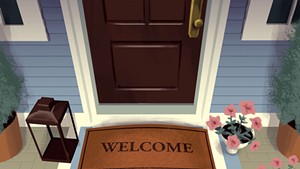
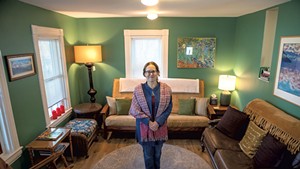
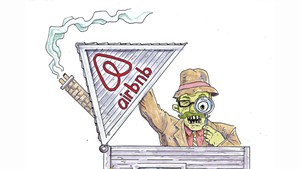
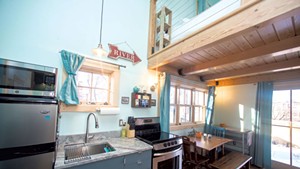








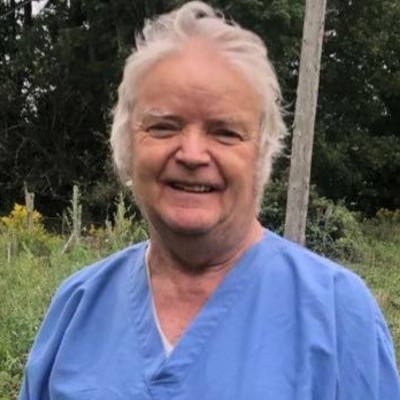

Comments
Comments are closed.
From 2014-2020, Seven Days allowed readers to comment on all stories posted on our website. While we've appreciated the suggestions and insights, right now Seven Days is prioritizing our core mission — producing high-quality, responsible local journalism — over moderating online debates between readers.
To criticize, correct or praise our reporting, please send us a letter to the editor or send us a tip. We’ll check it out and report the results.
Online comments may return when we have better tech tools for managing them. Thanks for reading.